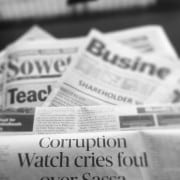|
Getting your Trinity Audio player ready...
|
 By Nicky Rehbock
By Nicky Rehbock
Corruption Watch today called for all those affected by the recently exposed collusive tendering in the construction industry – including municipalities, provinces and private entities – to institute civil claims for damages suffered.
This was made in a submission by the organisation to the Competition Tribunal for the hearings into the R1.46-billion settlement agreements facing top listed construction firms which rigged bids for, among other large projects, 2010 Soccer World Cup infrastructure projects.
The Competition Commission slapped 15 construction firms with the penalties in late June in exchange for their full and truthful disclosure about their bid-rigging activities between 2006 and 2010.
Twelve of these firms – including Aveng, Basil Read, Murray & Roberts and WBHO – agreed to the settlement; while Group 5, Construction ID and Power Construction did not accept and now face prosecution.
The value of these infrastructure projects amounted to R47-billion, R19-billion for private-sector work and R28-billion for public-sector developments. The Competition Commission investigation into the cartel activity was carried out over the last three years.
In its submission, Corruption Watch commended the Competition Commission for securing the R1.46-billion settlement agreements and admissions of guilt, and recommended that the Competition Tribunal confirm the settlements reached.
While Corruption Watch agrees the fines are not large enough to ensure effective deterrence, it does recognise that the settlement should go ahead because investigating and prosecuting firms for each and every project they were involved in would take too much time and cost too much money.
The three firms which did not agree to the settlement will now be prosecuted. If found guilty they will undoubtedly be hit by significantly higher penalties. Those who have settled have undertaken to cooperate in the investigation and prosecution of their co-conspirators who have refused to settle.
In its submissions, Corruption Watch pointed to other action that could be taken to increase the effective penalties imposed on the firms settling, and so increase the level of deterrence.
In particular, Corruption Watch called on all those affected by the collusive tendering – including municipalities, provinces and private entities – to institute civil claims for damages suffered.
The organisation also called on shareholders – particularly pension fund trustees and public financial institutions such as the Public Investment Corporation – to take legal action against directors who had been aware of, or who should have been aware of this conduct – conduct which has now undermined the value and reputation of their investments.
Corruption Watch also called for the relevant prosecuting authorities to lay criminal charges against individual directors personally involved in the tender-rigging in terms of the Prevention and Combating of Corrupt Activities Act.
To prevent blaming others further down the chain of command, Corruption Watch called for Section 34 of the Act to be explored too – which mandates those in positions of authority to report any corrupt activity over R100 000 to the police. Failure to report means a hefty fine or up to 10 years in prison.
Corruption Watch also made the following recommendations to the Competition Tribunal:
- In future settlement agreements, the Competition Commission should name and shame individual perpetrators
- The Competition Commission must take swift action against those companies in the cartel who have not settled claims.
- Companies which have agreed to the settlement should claw back bonuses awarded to individuals implicated in the cartel.
- Companies which have agreed to the settlement should impose employment-related sanctions on individual perpetrators.
- The said companies must cooperate with the authorities in bringing individual perpetrators to book.
- The courts and, if necessary, policy- and law-makers must draw from international trends and provide for the trebling of damages in the case of corruption-related offences, including bid-rigging.
- A comprehensive and integrated approach to fighting corruption in South Africa, which involves multiple stakeholders, especially an engaged and active citizenry.
See our full oral submission here.
See our full written submission here.






